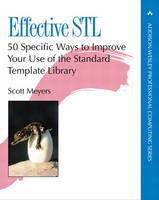
Effective STL
Addison Wesley (Verlag)
978-0-201-74962-5 (ISBN)
- Lieferbar
- Versandkostenfrei
- Auch auf Rechnung
- Artikel merken
C++'s Standard Template Library is revolutionary, but until now, learning to use it well has been a challenge. In this book, best-selling author Scott Meyers exposes critical rules of thumb experts use to get the most out of STL. Using the same clear, concise approach that made Effective C++ so successful, he shows developers exactly how to unravel STL's complexities -- and leverage its full power.KEY TOPICS:The book is organized into 50 guidelines, each followed by specific examples and to-the-point explanations. Meyers offers advice on what should be done, and why -- and what should not be done, and why not. Effective STL offers in-depth coverage of iterators, containers, allocators, string implementation, function objects, algorithms, equality, equivalence, and more. Discover how to choose among standard, non-standard, and non-STL containers; how to properly use algorithms and member functions that have the same names but subtly different behaviors; how to avoid potential portability problems; and how to maximize the efficiency of both the STL and the programs that use it.MARKET:An essential resource for all C++ programmers.
Scott Meyers is one of the world's foremost authorities on C++, providing training and consulting services to clients worldwide. He is the author of the best-selling Effective C++ series of books (Effective C++, More Effective C++, and Effective STL) and of the innovative Effective C++ CD. He is consulting editor for Addison Wesley's Effective Software Development Series and serves on the Advisory Board for The C++ Source (http://www.artima.com/cppsource). He holds a Ph.D. in Computer Science from Brown University. His web site is http://www.aristeia.com.
Preface xi Acknowledgments xv Introduction 1 Chapter 1: Containers 11 Item 1: Choose your containers with care. 11
Item 2: Beware the illusion of container-independent code. 15
Item 3: Make copying cheap and correct for objects in containers. 20
Item 4: Call empty instead of checking size() against zero. 23
Item 5: Prefer range member functions to their single-element counterparts. 24
Item 6: Be alert for C++’s most vexing parse. 33
Item 7: When using containers of newed pointers, remember to delete the pointers before the container is destroyed. 36
Item 8: Never create containers of auto_ptrs. 40
Item 9: Choose carefully among erasing options. 43
Item 10: Be aware of allocator conventions and restrictions. 48
Item 11: Understand the legitimate uses of custom allocators. 54
Item 12: Have realistic expectations about the thread safety of STL containers. 58
Chapter 2: vector and string 63 Item 13: Prefer vector and string to dynamically allocated arrays. 63
Item 14: Use reserve to avoid unnecessary reallocations. 66
Item 15: Be aware of variations in string implementations. 68
Item 16: Know how to pass vector and string data to legacy APIs. 74
Item 17: Use “the swap trick” to trim excess capacity. 77
Item 18: Avoid using vector. 79
Chapter 3: Associative Containers 83 Item 19: Understand the difference between equality and equivalence. 83
Item 20: Specify comparison types for associative containers of pointers. 88
Item 21: Always have comparison functions return false for equal values. 92
Item 22: Avoid in-place key modification in set and multiset. 95
Item 23: Consider replacing associative containers with sorted vectors. 100
Item 24: Choose carefully between map::operator[] and map::insert when efficiency is important. 106
Item 25: Familiarize yourself with the nonstandard hashed containers. 111
Chapter 4: Iterators 116 Item 26: Prefer iterator to const_iterator, reverse_iterator, and const_reverse_iterator. 116
Item 27: Use distance and advance to convert const_iterators to iterators. 120
Item 28: Understand how to use a reverse_iterator’s base iterator. 123
Item 29: Consider istreambuf_iterators for character by character input. 126
Chapter 5: Algorithms 128 Item 30: Make sure destination ranges are big enough. 129
Item 31: Know your sorting options. 133
Item 32: Follow remove-like algorithms by erase if you really want to remove something. 139
Item 33: Be wary of remove-like algorithms on containers of pointers. 143
Item 34: Note which algorithms expect sorted ranges. 146
Item 35: Implement simple case-insensitive string comparisons via mismatch or lexicographical_compare. 150
Item 36: Understand the proper implementation of copy_if. 154
Item 37: Use accumulate or for_each to summarize ranges. 156
Chapter 6: Functors, Functor Classes, Functions, etc. 162 Item 38: Design functor classes for pass-by-value. 162
Item 39: Make predicates pure functions. 166
Item 40: Make functor classes adaptable. 169
Item 41: Understand the reasons for ptr_fun, mem_fun, and mem_fun_ref. 173
Item 42: Make sure less means operator<. 177
Chapter 7: Programming with the STL 181 Item 43: Prefer algorithm calls to hand-written loops. 181
Item 44: Prefer member functions to algorithms with the same names. 190
Item 45: Distinguish among count, find, binary_search, lower_bound, upper_bound, and equal_range. 192
Item 46: Consider function objects instead of functions as algorithm parameters. 201
Item 47: Avoid producing write-only code. 206
Item 48: Always #include the proper headers. 209
Item 49: Learn to decipher STL-related compiler diagnostics. 210
Item 50: Familiarize yourself with STL-related web sites. 217
Bibliography 225 Appendix A: Locales and Case-Insensitive String Comparisons 229 Appendix B: Remarks on Microsoft’s STL Platforms 239 Index 245
| Erscheint lt. Verlag | 4.7.2001 |
|---|---|
| Reihe/Serie | Addison-Wesley Professional Computing Series |
| Verlagsort | Harlow |
| Sprache | englisch |
| Maße | 188 x 234 mm |
| Gewicht | 586 g |
| Themenwelt | Informatik ► Programmiersprachen / -werkzeuge ► C / C++ |
| ISBN-10 | 0-201-74962-9 / 0201749629 |
| ISBN-13 | 978-0-201-74962-5 / 9780201749625 |
| Zustand | Neuware |
| Haben Sie eine Frage zum Produkt? |
aus dem Bereich


